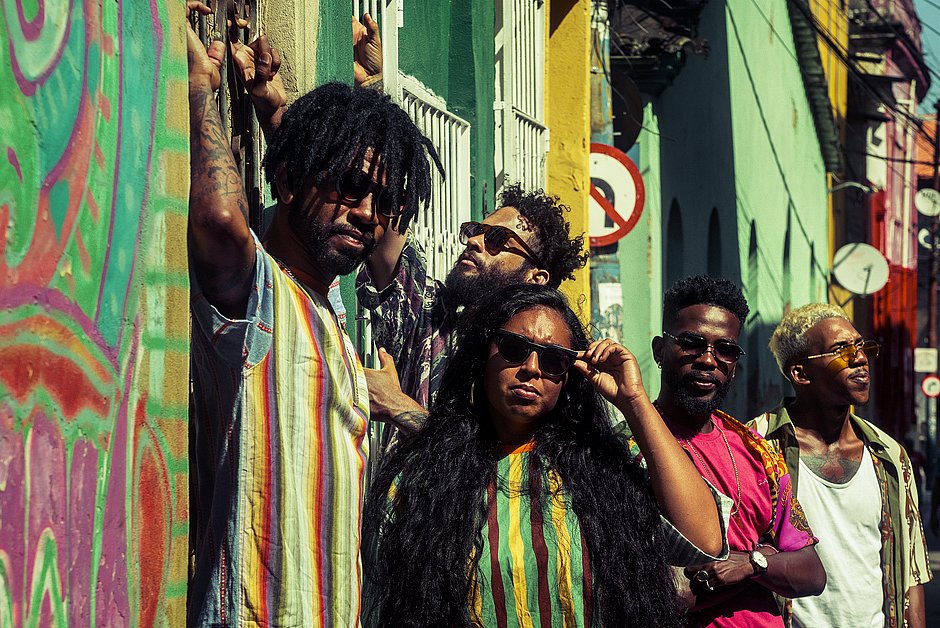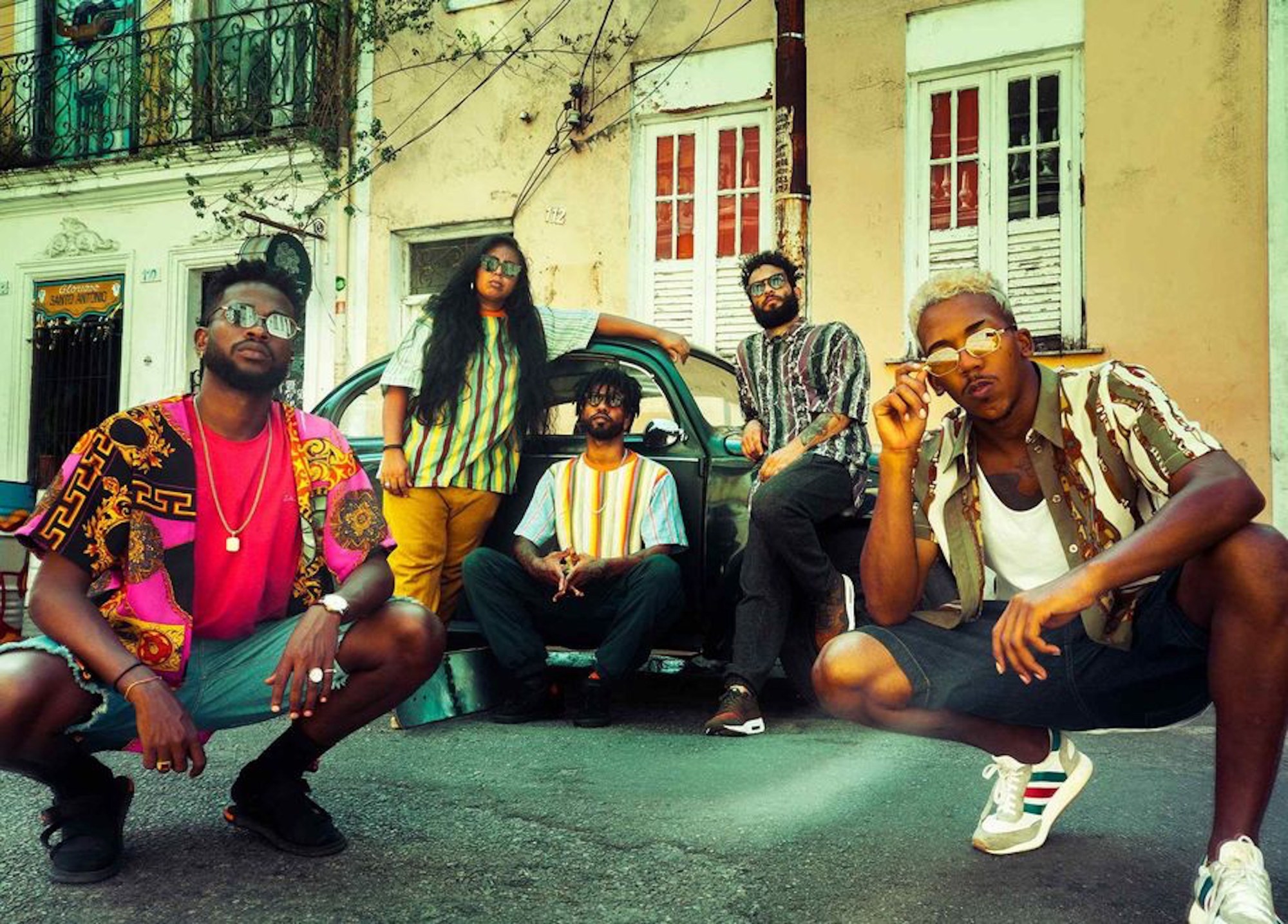It was just a few days before Brazil’s annual carnival in March when Afrocidade made a stop in Salvador. Over 1,000 fans, dressed in their party costumes—neon bikinis, tutus, extravagantly bedazzled headpieces, butterfly wings—gathered on the beach to see the Afro-Brazilian band, whose music has been pounding out of car stereos, street boomboxes, and house parties across the city for the better part of four years.
As José Macedo, Afrocidade’s lead vocalist walked on stage in his trademark dreads rocking a Cavaliers basketball jersey, the crowd quickly surged to the front. For the next hour and a half, people sang along with the band, whose beat driven, statement-making lyrics have been slowly leaving their mark on black and brown Brazilian youth across the country’s Northeast Region.
Afrocidade translates to African city, and it’s a name that immediately speaks to the political identity of the band and the motivations behind it’s ten member crew. “When we started the band in 2015, it was something that was for the purpose of affirming black pride for Afro-Brazilians and also representing the bairros with predominantly Afro-Brazilian populations around Brazil,” said Eric Mazzone, backing vocalist and one of the band’s composers. Macedo’s voice is known for its depth and clarity, breaking at certain points in ways that add a stomach churning layer of emotion and magnetism to the lyrical storytelling.
Fernanda Maia is Afrocidade’s drummer and as the sole woman in the group, she’s one of the most recognizable members. When she sings she delivers lyrics in the form of a chant and a call to action. Her voice is as melodic as it is guttural. Guto Cabral and Deivite Marcel are the dance duo present at all the band shows and responsible for injecting unmatched energy into the crowd.
Formed in Camaçari, a small industrial town about 45 minutes outside of Salvador, Afrocidade grew from experimental musical sessions amongst friends to a movement with dedicated fans. Since the release of Cabeça de Tambor in 2016, the band’s profile has steadily grown. They’ve headlined festivals around the state of Bahia, played shows in Sao Paulo, and at Hootananny Brixton bar in London. Last year the group booked a slot on Estúdio Showlivre, a popular Brazilian platform for artists, introducing their music to an entirely different fanbase that might not have been familiar with their rhythmic compositions and musicality. Atabaques (tall Afro-Brazilian hand beaten drums), electric guitars, saxophones, xequerês (beaded shakers), and xylophones are the instruments most often used in their compositions and live shows.
“Our music is very much inspired by the sounds of the diaspora and it also exists on its own as a mixture of different sounds both local and international,” Mazzone said. “What happens in Brazil is when you have an Afro-Brazilian band, people try and box you into being one genre, and that’s something we have always tried to avoid. We take from Reggae, Rap, Funk, Música de Terreiro and Pagode.” The latter two are music genres created by Afro-Brazilians with Pagode being a sub-genre of Samba, and which was created by slaves in their slave quarters (senzalas) to be used during their party celebrations. Música de terreiro is the music played during worship ceremonies in the Afro-Brazilian religion of Candomblé. “All of our music is directly inspired by ancestral roots, heritage, and our experiences as black people in Brazil,” Mazzone continued.
Brazil calls to mind images of gorgeous white sandy beaches. It’s the birthplace of numerous Victoria’s Secret models, a soccer mecca, and plastic surgery central. Outside of aesthetics and sporting achievements, Brazil is a country with the largest number of African-descendants outside of Africa, second only to Nigeria, Africa’s most populous nation. It’s a country whose history with blackness is encompassed by Portuguese colonization, almost 400 years of slavery followed by government instituted miscegenation, which began in the late 1800s and lasted till the mid 19th century. Conversations on structural anti-black racism are difficult to have in a country whose social stability was built around the concept of color blindness and mistura de raça (mixing of the race). Anti-blackness cannot exist in a place where everyone is said to have some modicum of blackness inside them. It’s against this grain that Afrocidade’s music exists as a prickly thorn. On their EP, they sing about the strength and endurance of diasporic memory on a global scale, racism at carnival amidst the street parties,and the effects of capitalism on the poor.
“Right now in Brazil we are in a time of fighting. Fighting for our rights, for our people, and representation. At this point our music is música de protesto (protest music) and it’s something that we are not afraid of and do with pride,” Mazzone said.

Kerolayne Kemblim, a young Afro-Brazilian visual artist, born and based in the Amazon capital of Manaus, has been a fan of Afrocidade since she first saw an instagram clip of them performing alongside another Afro-Brazilian singer, Luedji Luna, almost two years ago. “When I first heard their music I was very taken by their sound, the swing of it and the movement. Later on, I began to contemplate the content of their lyrics,” she said. Kemblim is one of thousands of young Afro-Brazilian youth who are finding in music, a safe haven, from the current government helmed by President Jair Bolsonaro, nicknamed “The Trump of the Tropics.” Bolsonaro came into power early this year after winning the 2018 election on a campaign platform built off homophobia, sexism, anti-blackness, anti-indigeneity and an unwavering support of military surveillance on predominantly black neighborhoods. For Kemblim, Afrocidade is putting a spotlight on the realities facing disenfranchised and marginalized communities. “Their music discusses the experiences of black people who live on the periphery. They bring reflections on racism, on genocide, and black people living in the favelas. It’s a strong message to represent especially during our current political moment.”
The distance between Manaus and Camaçari is a six hour plane ride, but Kemblim has done it several times just to see the band. “We live in a country that is racist, machista, and homophobic so it’s important that we create alternative narratives to represent ourselves within these socially oppressive systems,” she said. “Afrocidade, like other bands and black visual artists using creativity to send messages, are a necessary tool needed to occupy spaces and create work that counters the discourse of hatred we are hearing on a daily basis.”
Now, the band is making plans to start recording their first album. It’s been three years since their EP and and from that alone they created a soundtrack that continues to bring down the house and echo during marches. At the end of the month, Afrocidade will be headlining a show in Salvador to mark the beginning of Sao Joao, a month long Summer festival in June, boasting 24-hr street parties and free music shows. “We are looking forward to playing and also continuing to perform for the people who have made our success possible and whose lives we honor in our music,” Mazzone said.
